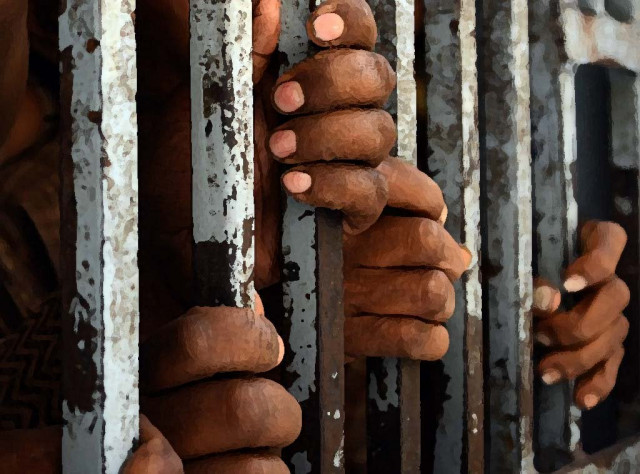Should poverty be considered in ‘diyat’ imposition, asks top court
Supreme Court mulls if poor convicts can be indefinitely detained for non-payment

Supreme Court mulls if poor convicts can be indefinitely detained for non-payment. PHOTO: AFP
A two-judge bench led by Justice Qazi Faez Isa has raised certain legal questions for adjudication in a matter wherein an individual named Shakeel Abbas had been convicted under Section 316 of the Pakistan Penal Code (PPC) for ‘qatl shibh-i-amd’, and sentenced to five years’ rigorous imprisonment and payment of ‘diyat’ under PPC Section 323 in the amount of Rs2,174,577.
The PPC’s Section 316 says whoever commits qatl shibh-i-amd shall be liable to pay ‘diyat’ and may also be punished with imprisonment for a term which may extend to twenty-five years as ta'zir. Section 323 of the PPC is on the value of ‘diyat’.
Legal questions
Justice Isa, while authoring the 3-page order, has asked whether a convict could be detained indefinitely if he failed to pay the ‘diyat’ on account of his poverty and whether such detention was in accordance with the injunctions of the Holy Qur’an and Sunnah, a requirement Section 323 of the PPC states must be fulfilled.
The order also noted that the PPC’s Section 323 requires the federal government to keep “in view the financial position of the convicts” in fixing the value of ‘diyat’. However, notifications issued thereunder simply fix the same ‘diyat’ amount payable by all convicts alike, i.e. the value of 30,630 grams of silver, and do not distinguish between convicts who can pay and those who cannot who then, on account of their inability to pay, remain incarcerated indefinitely.
The court order states that Rule 11 of the Diyat, Arsh and Daman Fund Rules, 2007 (“the Rules”) permits a convict “to be released on such terms and conditions as may be determined by the court for payment of remaining amount” after making “part payment” and “the court may pass an order for detention of the convict if he fails to fulfil the terms and conditions for release”.
“The question arises what constitutes “part payment”, what kind of “terms and conditions” can be imposed and whether on account of the financial inability of the convict the Court can pass an order for his detention”, says the order.
Directions
The court has issued notice to the Attorney General for Pakistan, Advocate General, Punjab and the Prosecutor General Punjab as these legal points require interpretation of the PPC and the Rules.
A notice has also been issued to the Ministry of Religious Affairs and Interfaith Harmony which is directed to forward a copy of this order to all the recognized Wafaqul Madaris and obtain their respective opinions regarding these points and, upon receipt of their opinions, forward the same to this court.
The court has also issued notice to Pakistan Bar Council Vice Chairman and the Director General, Shariah Academy of the International Islamic University, Islamabad as amicus to assist this court themselves or depute a learned person from their respective institution.
“It will be appreciated if all those to whom notices are issued file their respective submissions in writing within one month from receipt of this order”.
In view of the importance of the issues, the court directed the registrar office to place the matter before Chief Justice of Pakistan Gulzar Ahmed for consideration as to whether a bench of three or more judges should adjudicate these legal questions.
Facts of case
A First Information Report (FIR) was registered at police station Saddar, District Chakwal on 6th August 2016 on the report of Sumbal Khalil alleging that her husband Shakeel Abbas had killed their two minor sons, namely Abu Zar, aged two years, and Farman Haider, aged about six months. The trial court had convicted him under section 302 (b) of the Pakistan Penal Code (PPC) on two counts and sentenced him to imprisonment for life but ordered the running of sentences concurrently and directed payment of compensation to the legal heirs of the deceased of an amount of one hundred thousand rupees on account of each death and, in default thereof, to undergo simple imprisonment for six months on each count as well.
The appeal filed by Abbas was partly accepted by the High Court by acquitting him from the charge of murder and he was instead convicted under section 316 PPC for qatl shibh-i-amd and sentenced him to five years rigorous imprisonment and ordered him to pay diyat under Section 323 PPC of an amount of Rs2,174,577. The State did not challenge the petitioner’s acquittal under section 302 (b) of the PPC nor sought enhancement of his sentence.


















COMMENTS
Comments are moderated and generally will be posted if they are on-topic and not abusive.
For more information, please see our Comments FAQ